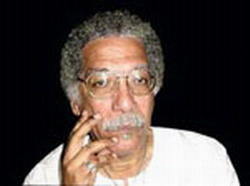Babá
- Submitted by: admin
- Arts and Culture
- Dance
- Music
- 09 / 07 / 2007

Rogelio Martinez Fure has dedicated his live to preserve, understand and multiply this heritage that in Cuba has mestizo gestures, as he is. Rogelio is an intellectual who became seven decades of successful adventures last week.
" Matanzas , where I was born the 28th of August 1937, is my starting point. I studied Civil and International Law in Havana University in very convulsed times. But I had no blood to practise law, or to become a diplomat. The Revolution triumphed and new tomes were coming. I joined the new Department of Ethnology and Folklore of the National Theatre in 1960, with the maestro Argeliers León. Later on, in 1962, I took part in the foundation of the National Folklore Group. From that moment on my passion has been in studying the Cuban culture and its relationship with other culture".
Said like this, with his own words, it seems just a puff, but how much intelligence, memory and ardour in the findings of a very diverse work of the folklore creation - scripts for important shows, such as the congo, Yoruba, abakua Yoruba-iyesa shows of popular and country music - ; the essay - Diálogos imaginarios (Imaginary Dialogues) - the anthology - Yoruba Poetry, Anonymus African Poetry and the impressive collection Diwan that discovers the tradition and the modernity of the African lyric in several tongues-; the singing - singer of the Oru group - the composition - The Mulata from Havana -, and the pedagogy. For all these merits, he received the National Dance Award and the Cultural Research Award.
All this made from an integrated and dialectic conception that searches the communicating vessels that go from one to the next human community, in a projection that joins the identity with the diversity in an indivisible knot.
Baba means in lucumi tongue, father. Rogelio, in his own right, is called Baba by friends, colleagues and students. Let he receive a great gift in the name of all the Cubans.
Comments